Best Solar Panel Cleaning Equipment and Tools
Updated:

Various solar panel cleaning tools go into achieving the best solar panel cleaning equipment, from solar panel cleaning brushes with extension poles & squeegees to cleaning solutions, water pumps, and water deionizers/softeners.
While getting all these items in one solar panel cleaning kit is uncommon, you can get the best of each tool and create the perfect solar panel cleaning equipment.
Things to Consider
A good solar panel cleaning brush should be the softest you can get. If you clean a solar panel with a hard brush, the intense abrasive force will likely scratch and damage the panel’s surface.
But apart from having soft brush bristles, an ideal solar panel cleaning brush should come with an extension pole that allows you to clean the solar panel safely from the ground. It should feature a squeegee to remove excess water after the final rinse.
The best solar panel cleaning brushes may also have a design that allows water to flow through the brush head, so you can spray the panels down rapidly and rinse them easily after cleaning.
Ideally, water is the best fluid for cleaning modules of a solar system. But when the grime and dust are tough, rainwater alone is insufficient. You might need a cleaning solution because regular soaps and detergents will delaminate or damage the surface.
Good quality solar panel cleaning solutions are formulated without harsh chemicals, so you never have to worry about ruining the surface of your solar panel while cleaning.
A water pump will be useful when harnessing soft water from a natural source – like rainwater in a basin. While cleaning solar panels, avoid using hard water, as it will leave mineral deposits on the glass surface of your panels.
When the said deposits dry, the peak efficiency of solar panels may drop by as much as 30%. Generally, a small pump would suffice. You do not need strong water pressure since the brush’s scrubbing affects the main cleaning.
You can get a water softener/deionizer instead of a water pump. This will help convert your hard water to deionized water, so you never have to worry about mineral deposits.
Solar Panel Cleaning Products and Tools at a Glance
- EVERSPROUT Foot Scrub Brush – Foot Scrub Brush
- One Shot Solar Panel Cleaner Concentrate – Solar Panel Cleaner Concentrate
- Superior Pump 91330 1/3 HP – Water Pump
- WaterSentinel SF-20W Inline Hose – Deionized Water Garden Hose
- Vevor Water Fed Pole Kit – All-In-One Brush-Hose Kit
- Winsol Solar Brite Solar Panel Cleaning Soap Gallon – Gallon Cleaning Solution
Solar Panel Cleaning Products and Tools
Foot Scrub Brush
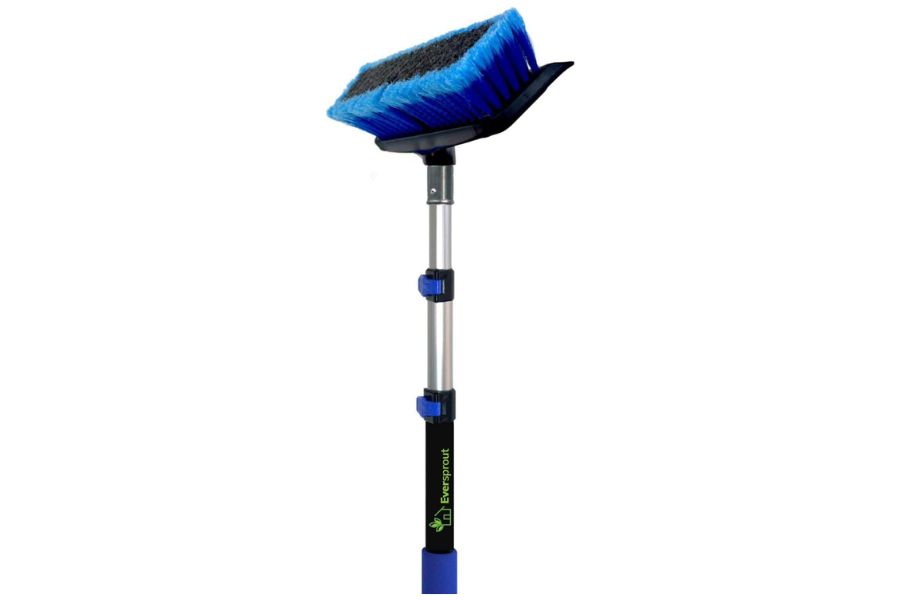
We opted for the foot scrub brush as our solar panel cleaning brush because it has soft bristles and features a squeegee and an extendable pole.
The top advantage of the EVERSPROUT Foot Scrub Brush is its no-scratch bristles. The bristles of the EVERSPROUT 1.5-to-3.5 Foot Scrub Brush are pretty soft. So, they only offer enough abrasive force to get the dirt off solar panels without leaving any scratches or damaging the surface.
Beyond the softness of the bristle, this scrub brush is made with a protective rubber bumper, which also prevents scratches to the surface of solar panels. Besides being a no-scratch, the bumper is a squeegee rubber. Once you are done rinsing the panel, flip the brush around and wipe the leftover water with the rubber bumper.
Besides the soft brush and no-scratch rubber, it features an extendable pole. The said pole can be extended to any length between 1.5 and 3.5 feet, and you can reach heights of around 8 to 10 feet when standing.
The extensive range of brush poles lets you clean your solar panels without getting on the roof. Of course, if you clean from the ground, the risk of falling and getting seriously injured is reduced.
Besides being extendable, the pole is not heavy – it weighs below one pound. So, maneuvering the brush while cleaning is pretty easy. Then again, the pole is made from lightweight aluminum, so you would not have to worry about corrosion.
The features of the EVERSPROUT Foot Scrub Brush are remarkable, no doubt. However, this product is not a soft flow-thru brush. So, you cannot attach it to a standard garden hose for water to flow through while cleaning. This means you have to get water to the surface of the solar panel with a hose.
Pros
- With the softness of this brush’s bristles and the rubber bumper, you never have to bother about scratches to your solar panels.
- With an extendable pole, this product allows you to reach heights as high as 10 feet while standing.
- Since the pole is made of aluminum, it is resistant to corrosion.
- The pole has a lightweight aluminum body, so handling and moving it while cleaning it is relatively easy.
Cons
- The pole is not flow-through.
Solar Panel Cleaner Concentrate
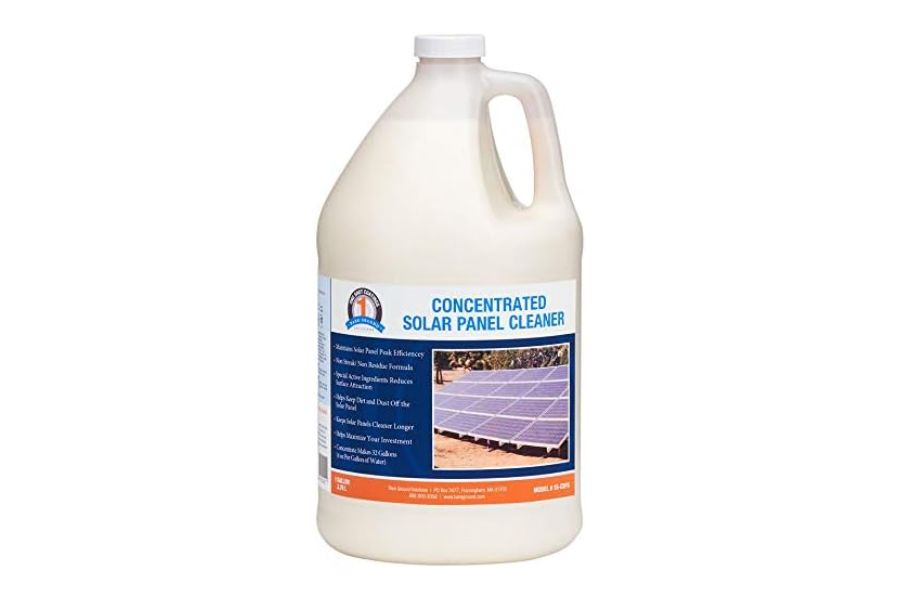
This solar panel cleaner concentrate is next in our review of solar panel cleaning tools. The One Shot Solar Panel Cleaner Concentrate is a solar panel cleaning solution known for its no-streak effect, zero-harsh-chemical content, and eco-friendliness.
This Solar Panel Cleaner Concentrate is a formulation that contains no ammonia, fumes, or acids. So, the chances of corrosion, delamination, or damage are almost non-existent when used on solar panels.
Besides being safe for solar panels, the absence of ammonia, fumes, acids, and VOCs in this cleaning solution is also good for the environment. Each one of them said chemicals pollute the environment in various ways.
Furthermore, the absence of ammonia, acids, VOCs, and other similar chemicals means you can safely clean – the said compounds can harm your health.
Beyond the environmental friendliness and safety, it offers, it is also non-smearing and streak-free. Plus, you can clean it out in one step. These features ensure that cleaning is uncomplicated and the cleaning process does not hamper the efficiency of your solar panels.
The panel cleaner concentrate disrupts surface tension to clean tough grime or bird droppings. This leaves the panel with loose debris or bird droppings that can be removed with a good scrubbing.
Since you only need about 4 ounces of this concentrate to make 1 gallon of cleaning solution, you can make up to 32 gallons with this product. This spells for cost-effectiveness.
Of course, One Shot is a top product. But you may not fancy how it smells.
Pros
- The One Shot is formulated to leave no streak or watermark after rinsing.
- Most of the compounds in the formulation are unharmful to humans or the environment at the concentrations in which they are used.
- You can get up to 32 gallons of cleaner when you dilute the whole bottle. So it is cost-effective.
- It takes one step to clean with this solution, making it easy to use.
Cons
- The smell may not be satisfactory.
Superior Pump
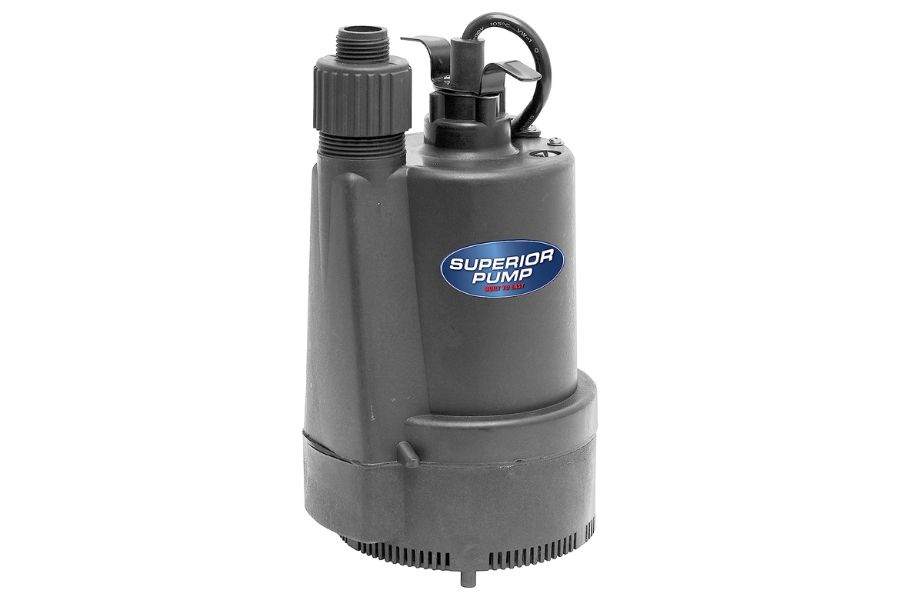
The Superior Pump found its way to reviewing the best solar panel cleaning tools because of its high lift and remarkable flow rate. But beyond those features, this pump is pretty durable and flexible.
The Superior Pump 91330 1/3 HP can pump a maximum flow rate of 2400 gallons per hour. You will definitely not be using as much as 2400 gallons in one hour while you clean your solar panels. So, the flow rate of this product is more than just enough for you.
Note that the flow rate reduces when you pump water through heights. For one, when pumping through a height of 10 feet, the maximum flow rate is just around 1680 gallons per hour. Of course, this is still more than enough to clean your solar panels.
With the Superior Pump, you get a maximum lift of up to 25 feet. So, even if the water source is at a spot far from the roof, you will surely get water to the solar panels.
Since the body is made of thermoplastic, you never have to worry about it getting corroded. Plus, thermoplastic offers decent resistance to heat, adding a little extra to the overall durability of the pump.
The pump offers multiple options for the discharge hook. It is also pretty lightweight. Hence, it is portable. However, the customer service is not very impressive.
Pros
- With a flow rate of over 1000 gallons per hour at around 10 feet, you will have no problem getting water to dirty solar panels on the roof.
- It is suited for taller houses with a maximum lift of 25 feet.
- A thermoplastic body means this pump is resistant to corrosion and heat.
Cons
- The customer service could be better.
Deionized Water Garden Hose
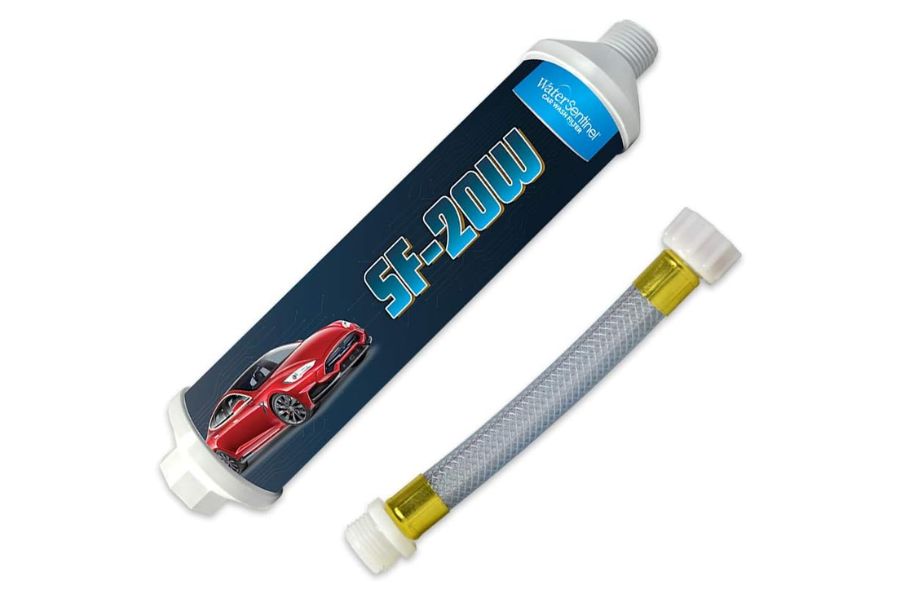
Last on our review of solar panel cleaning tools is this inline hose. The WaterSentinel garden hose is a non-invasive way to remove hardness from the water before cleaning solar panels. It comes as a tube that fits between your garden hose and the nozzle.
The WaterSentinel SF-20W Inline Hose comes with a flex extension and a tube. The tube contains DI media, which dissolves minerals in hard water. On the other hand, the flex extension connects the tube to the nozzle of your garden hose.
Besides deionization, the tube also filters the water that goes through it. It comes with a sediment pack on the inlet and outlet, which helps to remove substances like chlorine, sand, rust, dust, and slit from the water.
So, overall, the quality of the water that comes out of the WaterSentinel SF-20W Inline Hose is pretty topnotch.
To use the deionized water garden hose, attach the inlet end of the tube to the outlet of your garden hose. Then attach the outlet end of the tube to the inlet end of the flex extension. Then lastly, attach the outlet of the flex extension to the open end of your nozzle.
Besides offering a 2-way water purification process, the it is pretty durable. It is also easy to use, much more so than complicated large deionization systems. However, one drawback is that it can only be used for a limited number of washes.
Pros
- The WaterSentinel SF-20W Inline Hose improves water quality in two ways: dissolution of hardness-causing ions and filtration. So, the quality of the water output is impressive.
- This device is easy to install and not as complicated as larger deionization systems.
- Can be used in conjunction with a pressure washer.
Cons
- It is only useful for a limited number of solar panel cleaning sessions.
Vevor Water Fed Pole Kit Water Fed Brush 30 Ft For Window Solar Panel Cleaning
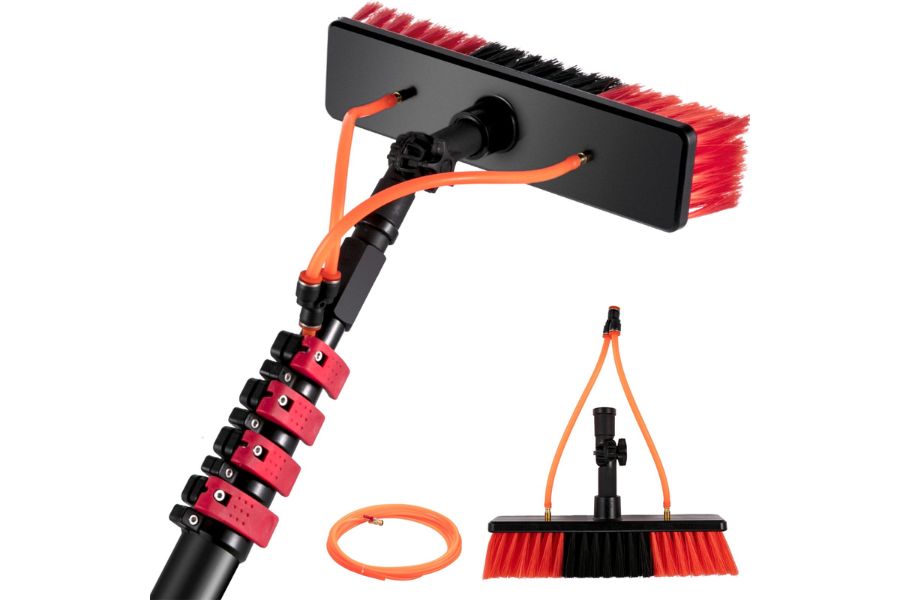
The maximum length of the Vevor Water Fed Pole Kit was its most striking feature for us. It made it possible to clean a large solar array without having to cross over the panels. In other words, it significantly improves the safety of the cleaning process.
The length of the pole being adjustable was the icing on the cake. When you’re not looking to go too long, you could reduce the length from 30 ft. to as low as 7 ft. You could also extend within the same range.
Another feature of note is the water-fed brush/squeegee (it came with a brush and a squeegee). That feature made things a lot easier while cleaning; at the least, it felt like the cleaning process was en suite. But more importantly, the coordination of the squeegee’s dirt removal, the ability to adjust the angle of the squeegee, and the water pressure made cleaning the solar panel more effective.
The fact that brush gets water through a flexible hose that is over 30-feet long meant that we didn’t have to worry too much about the distance of the panel from our water source.
Besides being extendable and long, the pole of the Vevor Water Fed Pole Kit was pretty sturdy. So, away from its array of functions, it is unlikely to break or bend. Also, while sturdy, it is still lightweight, so even your tired hands would still be able to move it around with ease.
All in all, the Vevor Water Fed Pole Kit simplified our solar panel cleaning process. Beyond the hose connector compatibility, it is a top product.
Pros
- Adjustable pole
- Comes with a brush and a squeegee. Of course, for solar panels, the squeegee is preferable.
- The brush/squeegee is water-fed, and its angle can be varied.
- Long flexible hose
Cons
- Hose connector compatibility issues
Winsol Solar Brite Solar Panel Cleaning Soap Gallon
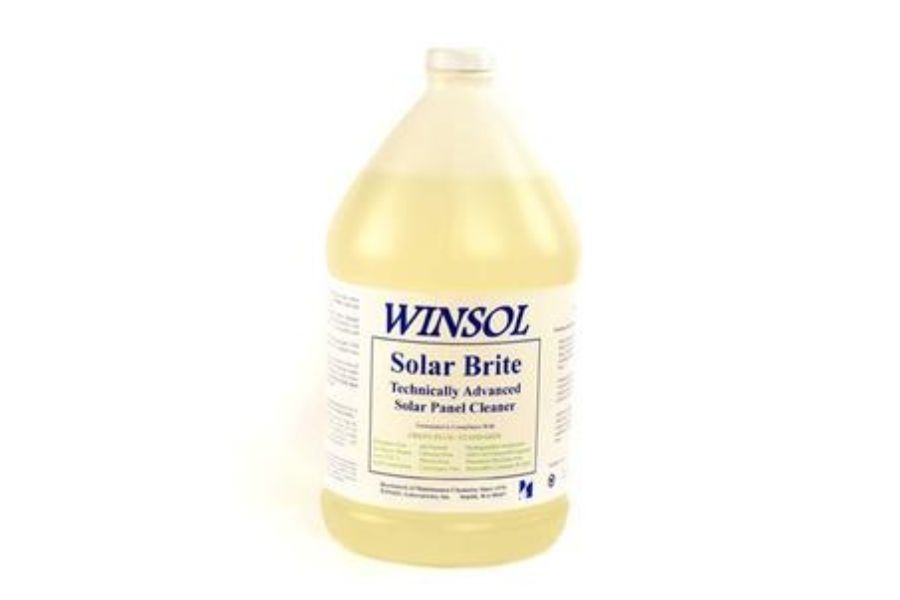
While it might not be our most loved feature of the Winsol Solar Brite Solar Panel Cleaning Soap Gallon, this gallon size is cost-effective. Basically, it’s getting more for less.
We loved the relative safety of this cleaning solution. It made the application of the solution easy as we were able to apply it with our hands. Of course, we could also use a soft brush or squeegee.
After cleaning our solar panel with the Winsol Solar Brite Solar Panel Cleaning Soap Gallon and rinsing the panel thoroughly, there was no streaking or residue. So, that’s one issue you wouldn’t have to worry about.
We also saw no signs of damage from applying the soap to the panel, so surely it isn’t corrosive to solar panels.
We think an additional upside to this product is that it is environment-friendly, even down to its container. But then, the large size of the container may be an issue when it comes to storage.
Pros
- Non-corrosive to solar panels
- Generally safe to use
- Cost-effective pack
- Environment-friendly
Cons
- The large size might be hard to store.
Buyer’s Guide
Soft Brush With Long Poles
The surfaces of solar panels are vital to their function and efficiency. If one part of the surface of a solar panel gets dented, the solar cell in that area may not receive as much sunlight as it normally does. Consequently, the overall efficiency and function of the panel will drop. Of course, as the damage spreads to more areas, the efficiency will drop further.
To avoid denting or delaminating solar panels while cleaning them, it is essential that you only opt for a brush whose bristles are soft. Such brushes offer an abrasive force that is just enough to scrape the tough dirt out without damaging the panel’s surface.
Apart from choosing a soft-bristled brush, ensure that you get one with a long extension pole. If your solar cleaning pole is long, you can clean safely from the ground or lower heights.
Non-Toxic Solar Panel Cleaning Supplies
The best liquid for cleaning a solar panel is water. But sometimes, you may need something extra for tough stains. This something should never be your typical detergent or soap.
If you clean solar panels with regular soaps and detergents, you will leave streaks behind on the surface of the modules. The streaks you left behind will, in turn, reduce the entry of light into the solar cells. Consequently, the solar power output of the panel will drop.
In place of regular cleaning supplies, you should opt for solar panel cleaning solutions. Ensure the product you choose contains no toxic chemicals. It should be free of VOCs, harsh chemicals, and other toxic substances. The said chemicals are dangerous not only to your PV panel but to you too.
High-Capacity Water Pumps
Their flow rate and maximum lift typify the capacity of water pumps. So, if you are getting a water pump to harness water from a source that contains soft water, check the flow rate and maximum lift.
The flow rate must be enough to meet your water needs throughout the cleaning period. Then the maximum lift should be on par or surpass the height where the solar panel is installed. It is best if the flow rate and lift of the pump exceed your requirements.
Water Softeners
If you cannot get a source of soft water, then you can opt for a water deionizer or softener. Remember, if hardness-causing minerals dry on the surface of your solar panel, they will leave streaks. Unfortunately, the said streaks will reduce the amount of sunlight getting to the solar cells.
What Is the Best Way to Clean Solar Panels?
- Start by rinsing the solar panels with clean water to remove loose dirt.
- Next, gently wash the surface of the panel with your soft-bristled brush.
- If there are stains that you cannot get out with the first two steps, apply some properly diluted solar panel cleaning solution to the solar panel. Then scrub gently with the brush until clean.
- Rinse the panel one more time with clean water. Then squeegee the surface until all the excess water is removed.








